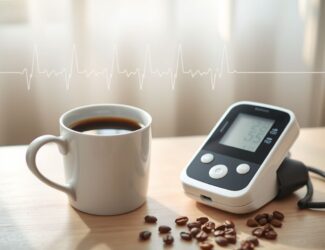
Drinking 3+ Cups of Coffee a Day May Actually Lower Blood Pressure
Drinking 3+ Cups of Coffee a Day May Actually Lower Blood Pressure, According to a New Study
At over 2 billion cups consumed daily, coffee just may be the world’s favourite beverage. But if you’ve ever felt that second (or third, or fourth) cup give you a case of the jitters, you may have wondered what coffee’s effect is on blood pressure, as well as on overall heart health.
The conventional wisdom has been that it significantly raises blood pressure levels, at least temporarily. But a new study, published in Nutrients, found the opposite to be true. Could lowering blood pressure be one of coffee’s benefits?
Blood pressure, heart health, and coffee: What the research says
Decades-old studies typically found that coffee wasn’t a healthy choice for cardiovascular health. This may have as much to do with brewing methods, as it does with the beverage itself. Back in the day, old-school brewing was typically done with a percolator instead of a coffeemaker containing a filter. Filtering removes substances and oils, such as cafestol and kahweol, that have been linked to high cholesterol and heart disease (sorry, filter-free French press lovers).
More recent data, however, has found multiple benefits from drinking coffee, especially for blood pressure and heart health.
The recent study in Nutrients is a sub-analysis of participants from the Brisighella Heart in Study (BHS). BHS was started in 1972, in the Brisighella region of northern rural Italy. Using self-reported data about coffee consumption from 720 men and 783 women, researchers observed the effects of coffee on blood pressure and other heart-health markers, like arterial stiffness (hardening of the arteries). According to study authors, people who drank three or more cups of coffee a day had lower blood pressure readings than those who drank no coffee at all. People who only drank two cups a day also had lower blood pressure than non-drinkers.
In addition to reporting these findings, study authors were quick to note the omissions in data that might color their results. For example, coffee cup size per drink was not accounted for. Neither were brewing methods, or bean origins. Based on cultural norms among people in North Italy, the researchers assumed that caffeinated coffee was always the participants’ brew of choice, rather than decaf, but this was not confirmed. Lifestyle habits that could impact upon blood pressure were also not recorded or addressed.
“While this study does make a compelling argument for the benefits of coffee, it is very important to understand its limitations before reaching for that third cup. Importantly, this study was performed in Italy, where a single coffee is a fraction of the size of a standard American coffee. So, three cups of coffee in Italy might be the equivalent of one regular-sized Starbucks in the States,” says Anais Hausvater, MD, a cardiologist at NYU Langone Health in New York City.
The effect of caffeine on blood pressure
When we think coffee, we naturally think caffeine. According to Mayo Clinic, the caffeine content in an average cup of coffee can cause a brief, but significant spike in blood pressure, even in people who typically have regular readings.
The reason why caffeine has this effect is unclear. What is clear, however, is that caffeine affects different people differently. “Frequency of coffee consumption plays a role in its effect on blood pressure. In those who don’t consume caffeinated coffee regularly, it may raise blood pressure. It does this by raising the level of stress hormones which tighten blood vessels. In those who drink it regularly, coffee does not seem to raise blood pressure, as the body becomes accustomed to it,” says Jeffrey M. Tyler, MD, a cardiologist with Providence St. Joseph Hospital in California.
Dr. Hausvater notes that coffee can increase blood pressure in the short term by activating the sympathetic nervous system, or “fight or flight” response, in people who aren’t tolerant to caffeine.
Coffee’s other compounds
Coffee is about more than just caffeine, though. That simple, delectable brew actually contains more than 1,000 chemical compounds, including many that support heart health.
“The reason for lower blood pressure in the Italian study may be related to the metabolically active components of coffee, including phenolic compounds, alkaloids, and diterpenes, among others,” explains Heather Shenkman, MD, a cardiologist, and formulator at 1MD Nutrition. Some of these compounds may raise blood pressure, but others can lower it.
So, what’s a coffee lover to do?
If you’re worried about blood pressure, should you drink more coffee, based on this data?
Dr. Tyler notes that the Italian study merely indicated an association between increased coffee intake and lower blood pressure. It did not, however, prove that coffee was the cause.
For that reason, Dr. Tyler isn’t changing his overall recommendation for his own patients: “If you enjoy drinking coffee, drinking it in small or moderate amounts (up to four or five cups a day) should be fine. In contrast, I advise all my patients, with or without heart disease, to avoid energy drinks that often have two to four times as much caffeine as coffee. If you’re looking to make a change, eliminate those, since they may put more stress on the heart,” he says.
However, Dr. Hausvater adds that coffee can have negative effects on the heart in some people, such as increasing the likelihood of abnormal heart rhythms. It’s important to talk to your doctor about how much coffee you should be drinking if you have a known condition.
The bottom line: You do you. If coffee agrees with you and you love it, keep enjoying it as often as you like. If you’re looking, however, for a quick fix to reduce high blood pressure, increasing your uptake probably isn’t the way to go. Instead, explore lifestyle changes that can be beneficial, like exercising and eating heart-healthy food. You can also talk to your healthcare provider about medications that can help.



